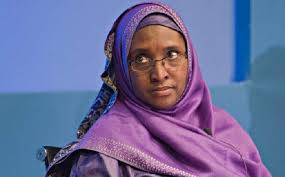The Federal Executive Council (FEC), yesterday, approved a N1.5 trillion cut from the 2020 Budget.
Minister of Finance, Budget and National Planning, Mrs Zainab Ahmed, who disclosed this while addressing State House Correspondents after the Wednesday’s FEC meeting, said the budget cut was one of the measures approved by the federal government to stabilize the economy.
It would be recalled that President Muhammadu Buhari, last week, constituted a committee to assess the impact of the Novel Coronavirus (COVID-19) pandemic outbreak, as well as the crash of crude oil price, on the economy and propose measures to sustain the economy.
However, the Minister of Finance said her committee had briefed the FEC on the measures it had come up with, adding that the presentation was approved.
She said the measures were arrived at, considering the current economic realities, adding that government would be working on a worst scenario oil benchmark of $30 per barrel at 2.18 million barrels per day.
Some of the measures, according to her, include a cut down on the size of the federally funded upstream projects by N457 billion, reduction of projected revenue from excise duty, cut down on capital expenditure by 20%, a reduction of recurrent expenditure by 25%, a ban on recruitment except for essential services and the review of social investment programme among others.
Some other measures approved were the reduction of projected revenue from privatisation by 50% and the suspension of recruitment exercise in the civil service.
“I’m pleased to report that just yesterday His Excellency has approved a number of measures for us to implement. These measures include the introduction of PMS price modulation mechanism. The reason being that at the low crude oil price of $30 to $32 per barrel, there’s no under-recovery. The under-recovery is right now zero, in fact, we are at an over recovery stage, meaning the PMS price will be reduced to reflect the reduced price of the crude oil in the international market.
“Mr President also approved that we should cut down on the size of the federally funded upstream projects of the petroleum sector. The reason being we want to be able to get more revenue, by less reductions from NNPC. The reduction of the crude oil price from the $57 per barrel that we budgeted to $30 means that we are going to get so much less revenue, almost 45% less than we planned and because of that we have to amend a lot of projections in the budget as well as in EMTEF to reflect our current realities.
“The President also agreed that we should do a scenario to reflect what the actual position will be with a $30 crude oil price, that is we were to anticipate what will be the worst case scenario and we’ve worked on that scenario and this scenario necessitates that quite a number of expenditures needed to be cut down, even as we review how we can enhance revenues that are not directly affected by the crude oil price decline.
“So we are looking at enhancing production to make sure that at the minimum the 2.18 million barrels that is in the budget as production volume is realised and NNPC has directives to that effect. We also need to adjust Customs revenue, which has been budgeted for at N1.5 trillion, but we are adjusting it downwards because we anticipate that trade volumes will reduce and once trade volumes reduce, Customs revenue will be significantly impacted as a result.
“We also have approvals to reduce the projected revenue from privatisation proceeds by as much as 50% because, again, with the slow down in economic activities, we are anticipating that the sale of independent power plants might not be fully realized as planned for in the budget.
“On the expenditure side, the President has approved that we should cut down the capital expenditure budgeted by 20% across ministries, departments and agencies and also a 25% cut of all government owned enterprises and these include the ones that are in the national budget: the ones that we included in the 2020 Budget, but also the ones that we didn’t include in the 2020 Budget. All of these MDAs will have their recurrent expenditure and capital expenditure cut down by 25%.
“By this measure, we expect that the operating surpluses that will accrue to the federation will increase because when their operational expenditure reduces, the operating surpluses that they remit to the treasury will also increase significantly.
“The other policy matter that has been discussed for implementation is for the administration to stop recruitment, except for essential services such as security and health services and to also restore and comply by the Civil Service Retirement Regulations.
“We’ve been asked also to review the modalities for the implementation of the social investment programme and finally to review the non-essential tax waivers that we are implementing right now to cut down on out tax expenditure so that we can realise more revenue.
“These measures mean that we are going to reengage with the National Assembly and we’ll be doing that shortly, may be from today or tomorrow, to revise the EMTEF as well as to revise the 2020 Budget”, she said.


